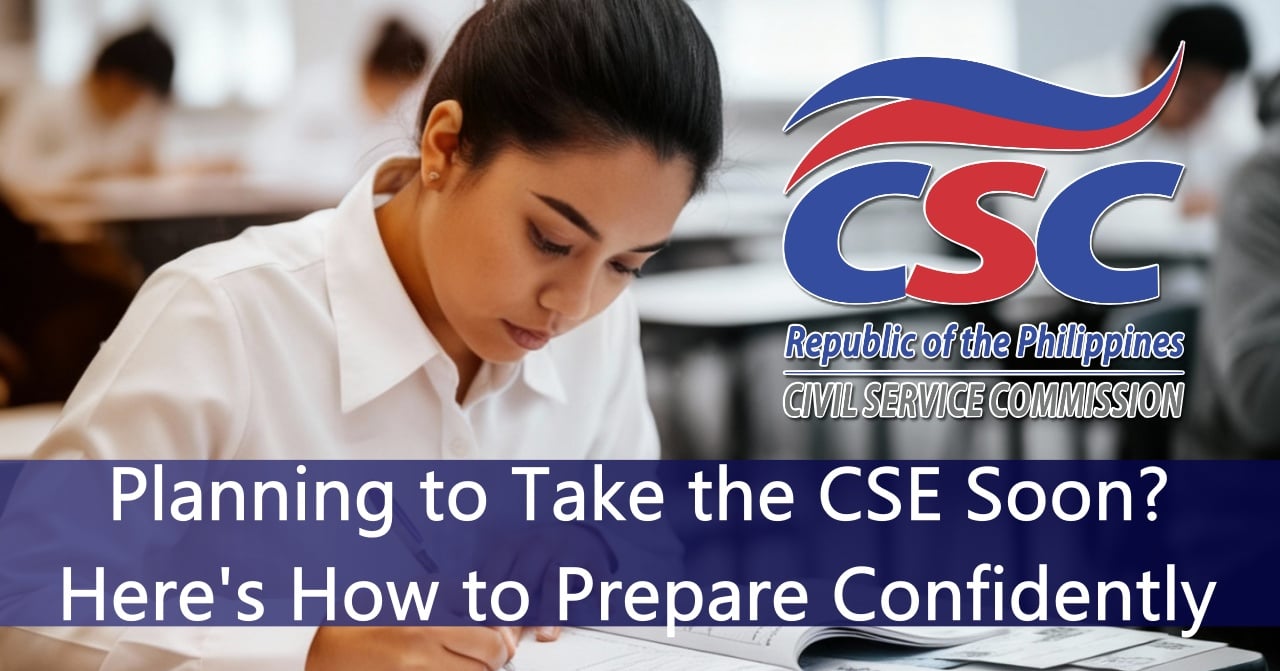Every year, thousands of Filipinos take the Civil Service Exam (CSE), hoping to secure a career in government. Yet, passing rates remain low—sometimes only around 14% of examinees succeed. This shows that strategy, not just effort, is the key to making it through. If you’re preparing for this exam, here’s a clear, step-by-step roadmap to improve your chances of passing.

Step 1: Know the Exam Inside Out
The CSC exam comes in two levels: Professional and Sub-Professional. Both measure your readiness for government service, but the Professional level opens more doors.
Coverage includes:
- Verbal Ability – grammar, vocabulary, and reading comprehension
- Numerical Ability – basic math, word problems, and data interpretation
- Clerical Ability – filing, sequencing, and following instructions (more focused in Sub-Professional level)
- General Information – the Philippine Constitution, government functions, and current events
Passing rate requirement: You must get at least 80% overall to pass.
Step 2: Build a Realistic Review Plan
Many fail the exam because they don’t plan their review well. Don’t just read and hope—you need structure.
- Start with a Diagnostic Test – Take a practice exam first to find out your weak points.
- Set a Daily Routine – Dedicate 1–3 hours a day for at least 4–6 weeks.
- Mix Practice & Theory – Alternate between answering mock tests and reviewing concepts.
- Do Time Management Drills – Practice answering under the 3-hour time limit.
Consistency matters more than last-minute cramming.
Step 3: Use the Right Materials
Not all reviewers are equal. Invest in resources that help you understand, not just memorize.
- Choose a reviewer with detailed explanations, not just answer keys.
- Download free CSC practice tests from trusted sources or buy updated books.
- Join study groups or refresher courses for extra support.
Remember, it’s not about having the most materials—it’s about using the right ones.
Step 4: Study Smart, Not Just Hard
The exam tests both knowledge and critical thinking. Here’s how to approach it smartly:
- Understand, Don’t Memorize – Especially for situational or problem-solving questions.
- Focus on Weak Points – If math is your struggle, dedicate more time there.
- Use Active Recall – Quiz yourself instead of rereading notes.
This method makes your study sessions more effective and less overwhelming.
Step 5: Keep Your Mind & Body Exam-Ready
A clear mind and healthy body can give you an edge on exam day.
- Eat brain-boosting foods like fish, nuts, dark chocolate, and bananas.
- Exercise lightly to stay alert.
- Sleep 7–8 hours, especially the night before.
- Avoid cramming on exam day—stick to a light review.
Preparation isn’t just about books; it’s also about balance.
Step 6: Exam Day Strategy
When the big day comes, confidence and focus are your best weapons.
- Arrive 30–45 minutes early to avoid rushing.
- Bring all requirements: valid ID, application receipt, pencils, eraser, water, and light snacks.
- Answer easy questions first, then go back to the harder ones.
- Never leave blanks—there’s no penalty for wrong answers.
This way, you maximize your score and minimize stress.
Quick Prep Timeline (6 Weeks Sample Plan)
| Week | Focus Area | Goal |
| 1 | Diagnostic Test + Planning | Identify strengths and weaknesses |
| 2–3 | Core Subjects | Strengthen weak areas |
| 4 | Mixed Drills | Improve speed and accuracy |
| 5 | Full Mock Exams | Simulate the real test |
| 6 | Light Review + Rest | Keep the mind fresh and calm |
Frequently Asked Questions
- How many hours a day should I study?
Aim for 1–3 focused hours daily. The key is consistency—short but regular sessions work better than last-minute cramming. - What’s the best way to review math if it’s my weakness?
Start with the basics (fractions, percentages, word problems), then practice timed drills. Break problems into steps and review mistakes to spot patterns. - How can I improve my reading comprehension quickly?
Practice summarizing short articles or passages. Focus on identifying the main idea, supporting details, and tone of the text. - Should I memorize the Philippine Constitution?
No. Instead of memorizing, understand the key principles, rights, and structures. The exam tests application, not just recall. - How do I avoid running out of time during the exam?
Practice answering under time pressure. On exam day, answer easy questions first, then return to the harder ones. This ensures you maximize your score.
Watch: How I Got Top 1 in the CSE (Civil Service Exam)
Jerome De Chavez shared how he climbed to the top spot in the Civil Service Exam by sticking to a focused review plan and smart time management.
He studied during lunch breaks, skipped distractions, and used strategy games to sharpen his thinking.
Instead of cramming, he reviewed weak subjects first and practiced strong ones to avoid overconfidence.
He taught others what he learned, applied concepts to daily tasks, and stayed consistent even with a busy schedule.
Not everyone may land the top rank—but with proven habits and tips from those who did, passing the exam can be closer than you think.
Final Thoughts
The Civil Service exam is challenging, but not impossible. With only around 14% passing in some batches, the difference comes down to preparation and strategy. By knowing the coverage, following a solid review plan, using the right materials, and staying exam-ready, you give yourself the best chance to succeed.
Think of it this way: you’re not just studying for an exam—you’re preparing for a career in public service. And that’s worth every bit of effort you put in today.
